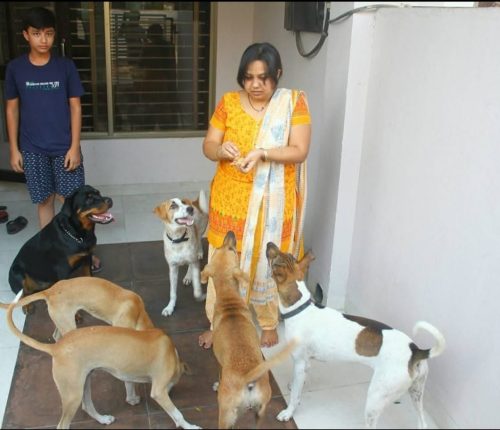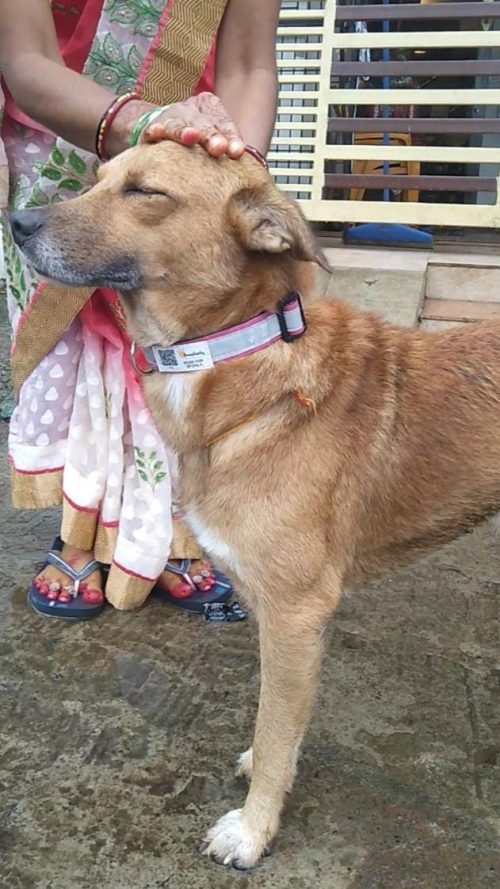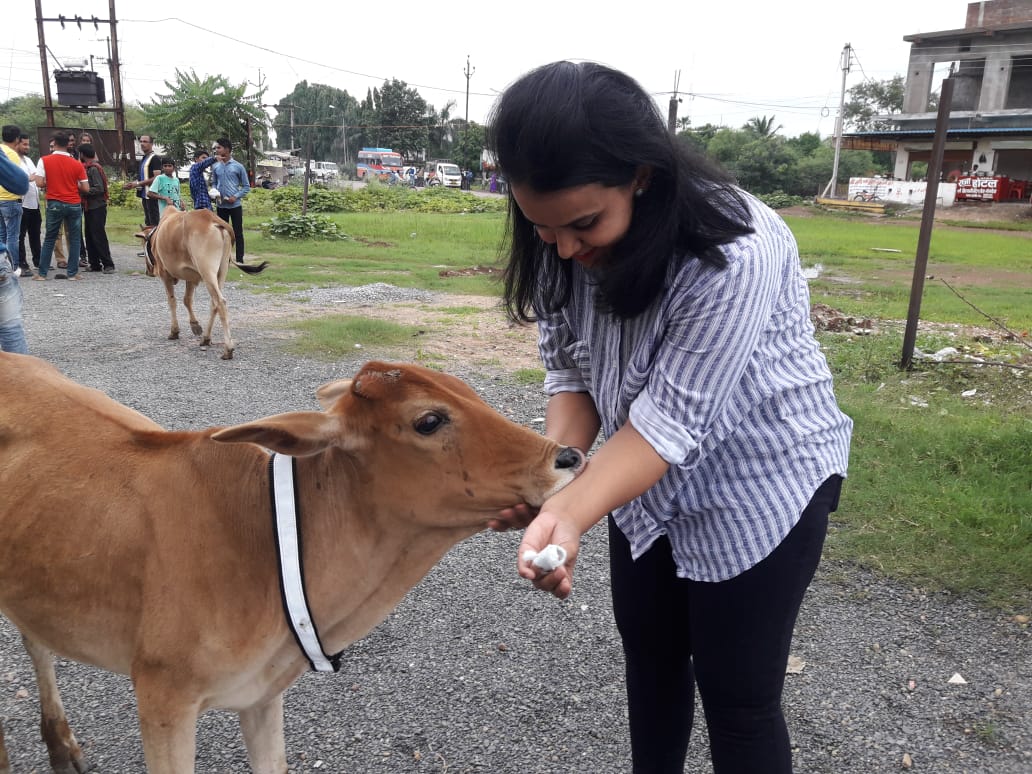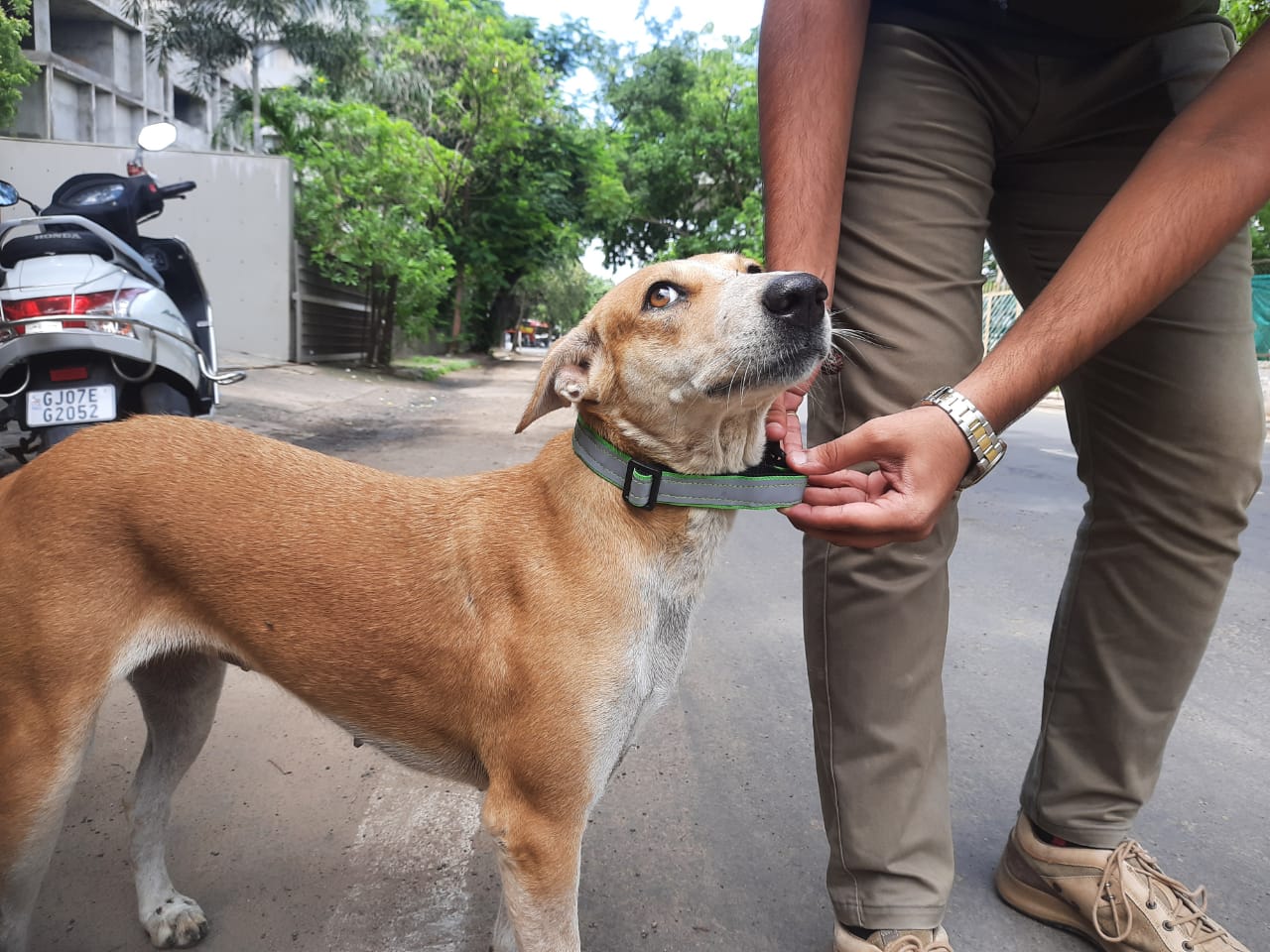Rimjhim Joshi Shende, a gentle soul from Indore, has always possessed an unwavering compassion for stray dogs. A former educator and an active participant in local animal welfare communities, her affection towards street animals turned into a powerful source of inspiration after a heartbreaking incident.
In 2015, Rimjhim awoke to terrible news. An elderly, ebony-hued canine, a familiar face in the neighborhood, fell victim to a careless collision. “It was dark, and he was hard to spot. His lower body was badly injured, and even after people tried to help him, he couldn’t make it,” Rimjhim tells The Better India.

“The person who accidentally hit the dog did not do so on purpose. We were told that he tried to help after the accident, too. But he did not see the dog during the night and he was guiltridden,” she adds.
Driven by this experience, Rimjhim found a way to address this issue. What started as a simple desire to make roads safer for animals and people alike, has now turned into Pawsitivity — a successful venture focused on manufacturing QR-enabled reflective collars for stray animals, all made by a team of underprivileged women.
A simple solution with a big impact
When she started making the collars in 2016, the concept to design a reflective collar that could be worn by stray animals to make them more visible to drivers at night was simple. However, creating this collar required an insight into the industry that she, as a teacher, did not have.
However, when she started making the reflective collars for Pawsitivity and interacting with the dogs that Rimjhim and her husband Tushar would take care of, she softened a bit. “I realised that I was earning a significant amount every month by working for these animals. It was only fair that I gave some love back. So, I began befriending and feeding them. Some people might not like it, but I do now,” she shares. “Because of didi’s (Rimjhim’s) company, I was able to work in fewer houses, and could spend more time on my own.”
She lacked the knowledge of where to source the materials or who could manufacture the collars. It was Reena, her house help at the time, who stepped in. She suggested where they could find the necessary materials and mentioned that she had some basic stitching skills that could come in handy. “So we worked together, and the very first batch of collars that we made, we made with her help,” Rimjhim says.
Reena Dhanak, 35, from a small settlement near Indore, has her own unique journey in animal welfare. “To be honest, I was always against having dogs loitering outside my house — not because I didn’t like them, but because I was scared,” she laughs.

Rimjhim, who was more than pleased to help somebody so close to her, then decided that since their very first employee was a woman who could use a little push, they would exclusively work with underprivileged women. Although it took three years for Pawsitivity to become a self-sustaining business, by 2019, they had grown large enough to offer training and machines to these women, enabling them to work from home.
The women, who were once dependent on low-paying jobs, now had the opportunity to earn well. “We pay them per piece, and they usually earn anywhere from 15,000 to 18,000 rupees per month, depending on how many collars they make. During the festive season, the demand increases, and they earn even more,” Rimjhim shares.
Currently, there are 12 women working with Pawsitivity, and the organisation plans to expand. These women receive training, compensation, and the dignity of stable employment, which has had a profound impact on their lives.
QR enabled collars
The flagship collar in Pawsitivity’s range is a QR code-enabled collar that addresses several key issues. By offering essential information about the dog, including its name (if it has one), supposed age, vaccination history, medical history, and location, the collar serves as a lifesaving ID. It can be scanned by anyone who finds the dog, enabling them to access crucial details about the animal’s health and help reunite lost dogs with their feeders.
The company also conducts vaccination drives, offering the QR code collars as part of their efforts to promote health and safety for street dogs. “The QR code allows feeders to track vaccinations and sterilisations, to make sure that the animals are well cared for without unnecessary duplication of medical treatments,” Rimjhim explains.

Many individual feeders wanted to help the animals they cared for, but the financial burden of providing food and medical care often made it difficult to afford additional costs, such as protective collars. Considering these facts, Rimjhim and her team provide these collars at a relatively affordable price of 40-60 rupees per piece. As she puts it, “Our goal was to make sure that, no matter the circumstances, animals can have access to something as simple as a reflective collar without adding to the financial strain of their caregivers.”
Learning as you grow
In the early days, Pawsitivity faced several challenges. One recurring issue was that people would steal the collars off the dogs. To address this, they designed an anti-theft buckle that made it much harder for anyone to remove the collar without the dog’s trust.
Another challenge arose when people requested collars for puppies. However, as Rimjhim explains, “Giving collars to smaller animals can prove to be dangerous. Because after the photo op is done, what are the chances that somebody will keep an eye on the animal as it grows up? So, we decided to only provide small collars to known NGOs and volunteers who we knew and trusted, who could monitor and update them as they grew.”

Seema Tank, a 43-year-old Animal Welfare Officer from Maharashtra, speaks out of her own experience of working in the field. “We see that during the festive season, firecrackers cause a lot of panic and disorientation in dogs. So these QR collars really help in reconnecting the lost animals to their caretakers or NGOs,” she shares.
Seema’s group in Navi Mumbai relies heavily on these collars, as they are a lifesaver on highways. “Without them, many dogs would be invisible to drivers, and accidents are inevitable,” she says.
Educating the next generation of the animal welfare community
Tushar Shende (39), Rimjhim’s husband, has been a crucial part of the Pawsitivity journey, handling the administrative and operational aspects of the venture along with his own job. Tushar, who was once terrified of dogs, now understands their needs and the importance of spreading awareness about responsible feeding and animal interaction.
Together, they both have been conducting school awareness programmes to teach children how to safely approach stray dogs and behave around them. “A lack of understanding can lead to either the children hurting the animal or getting hurt themselves,” Tushar explains. “What we are trying to do is teach children how to safely and respectfully interact with animals, creating positive experiences for both the animals and the people.”
These programmes are an essential part of Pawsitivity’s mission, ensuring that children grow up with a better understanding of street animals and a greater sense of empathy towards them. With Rimjhim’s connections as a former teacher, they’ve been able to access various schools and run workshops that sensitise young minds to the needs of stray animals.
While Rimjhim and her husband have faced many challenges, including financial difficulties during the COVID-19 pandemic, their passion for animal welfare has never faltered. “When I was pregnant during COVID, things were especially difficult,” Rimjhim shares. “But we got a big order from an NGO that kept us going. It was during that time that I realised how much support we had from the animal welfare community. Our friend and supporter, the late Meenakshi Mahapatra, was truly an angel and helped us when we thought we would have to stop the work.”
Pawsitivity has seen significant growth, with revenue reaching Rs 56 lakh in 2023 and projections for 2024 set at Rs 77 lakh. The company has served over 1.5 lakh customers, including animal feeders, NGOs, and pet owners looking to better the safety of stray dogs and other animals.
Rimjhim’s focus remains on providing affordable, high-quality reflective collars to these groups, while also empowering women and supporting broader animal welfare efforts. The company’s pricing structure has made the collars accessible to many feeders who would otherwise find it difficult to afford such products.
Edited by Arunava Banerjee; All images courtesy Rimjhim Joshi Shende
No comments:
Post a Comment